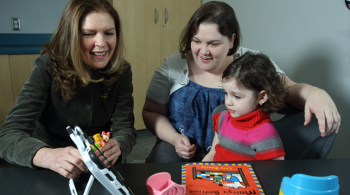By Taylor Gleason
Every day, scientists at Kennedy Krieger Institute study nervous system diseases and disorders with the aim of learning more and developing new treatments. Here are three recent advances we’ve made that reflect the dedication, innovation and collaborative spirit driving our community forward.

Autism Is More Likely to Reoccur in Families With Autistic Children
A study by Dr. Rebecca Landa, vice president and executive director of the Institute’s Center for Autism Services, Science and Innovation (CASSITM), along with her colleagues, revealed that one in five children with an older sibling diagnosed with autism is also likely to be diagnosed with autism. The recurrence rate rises to over 36% for families with more than one autistic child.
The groundbreaking research also showed that younger siblings of girls with autism have a higher likelihood (34%) of having autism compared to those of boys (22%). The study emphasizes the importance of early developmental monitoring for younger children, especially for families with older autistic children.

How Brain Training Improves Reading and Brain Functioning for Children With Dyslexia
A study by Dr. Tzipi Horowitz-Kraus and the team at the Institute’s Center for Neurodevelopmental and Imaging Research tested a special reading program designed to help children with dyslexia by improving their reading fluency, along with attention and organization—also known as executive function—skills.
In the study, 120 children—55 with dyslexia—practiced reading sentences in a paced, rhythmic manner while the letters were deleted from the screen. Afterward, the children with dyslexia showed the most significant improvement in reading, with their brain scans revealing stronger connections in areas responsible for processing sight, sound and executive functions. They also recorded improved reading accuracy and speed. The study concluded that combining reading practice with exercises to improve executive function results in improved reading fluency.

Improving COVID-19 Vaccination Rates and Health Literacy
A study by Dr. Ernest Carter showed how community health workers can improve COVID-19 vaccination rates and health literacy among members of underserved communities. Members of these communities often face barriers like low income, language challenges and misinformation, factors which contributed to these communities being disproportionately affected by the pandemic.
In the study, local health workers received training on how to provide culturally tailored information, resulting in a 345% increase in vaccinations, including a 512% rise in vaccinations among non-native English speakers. These results underscore the vital role of trusted community members in overcoming vaccine hesitancy and improving health outcomes in underserved populations.















